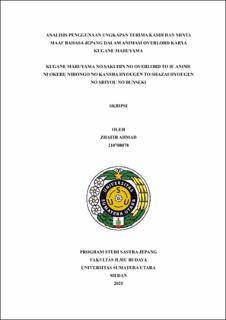| dc.description.abstract | This study describes the forms, meanings, and uses of expressions of gratitude and apology in Japanese as found in the dialogues between characters in the anime Overlord Season 1. The Japanese language has a complex politeness system (keigo), the use of which is strongly influenced by conversational context, social relationships, and the uchi–soto concept, all of which affect how expressions of gratitude and apology are realized. The aim of this research is to describe the forms and meanings of Japanese expressions of gratitude and apology, as well as to analyze their use in character dialogues. This study employs a qualitative descriptive method. The data were obtained from dialogues containing gratitude and apology expressions in Overlord Season 1 through documentation and literature study. The theories used include pragmatics, context, politeness in language, and the uchi–soto concept to understand the forms, meanings, and uses of the expressions according to character relationships. The results show that the variations of apology and gratitude expressions range from casual forms to honorific (sonkeigo) and humble (kenjougo) forms, with meanings adjusted to situations, levels of politeness, and the speaker’s social positions. The use of these expressions functions not only as a display of politeness but also as a communication strategy reflecting character traits, social hierarchy, and the values of politeness in Japanese culture as represented by the characters in Overlord Season 1. | en_US |


